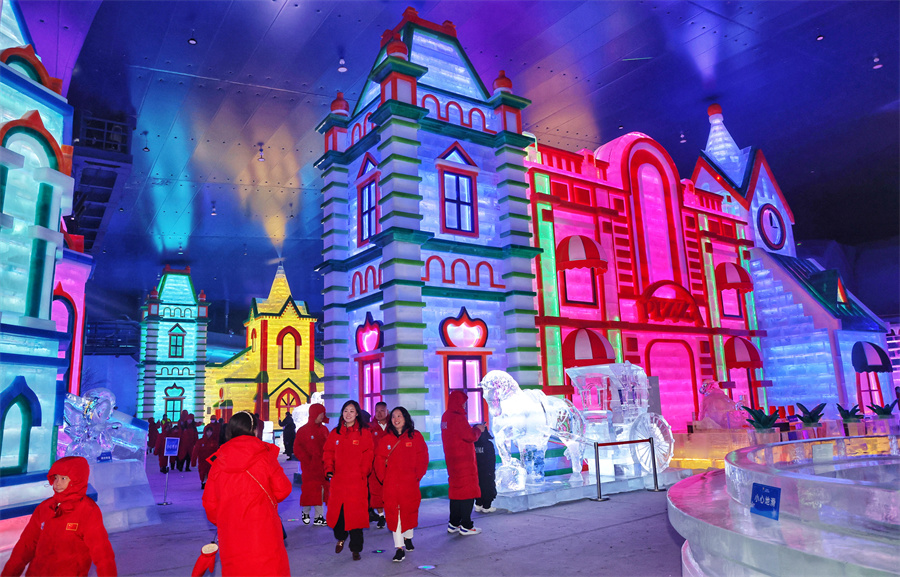
I was sitting in a packed shuttle van traveling from Zhuaji village to Fuyuan city of Heilongjiang province. Having stayed in Fuyuan city's Zhuaji village — known as China's easternmost village — for a few days to escape Beijing's hot summer, I had boarded the village shuttle for Fuyuan, the closest city for both sightseeing and shopping.
The other seven passengers on the van were all villagers. They belonged to different ethnic minority groups including Hezhe, Han and Manchu, but they all spoke fluent Mandarin with a local accent, though. During the one-hour journey, we engaged in a friendly conversation, especially after they learned that I was a retired journalist from Beijing.
READ MORE: World's largest indoor ice, snow theme park opens in China's Harbin
One of the villagers was carrying a few bags of vegetables to sell in the city market in the hope of getting a better price. Another villager was visiting the city to join his relatives for tomb sweeping for his late parents while the others planned to buy parts to fix their boats for the fishing season starting September. They seemed happy about the development projects in their village, especially about the ongoing work on a modern farming project for a cost of 700 million yuan ($98.25 million), as well as a sewage-treatment plant, and a heating plant to serve the village.
Hezhe is one of the smallest ethnic minority groups in China with a population of a little more than 5,000. Most of the Hezhe villagers earn their living by fishing in the Wusulijiang and Heilongjiang rivers. My childhood knowledge about the Hezhe people is that they wear clothes made of fish skin, catch fish using backward tools and live a miserable life that is far removed from modern civilization.
I was prepared for a cultural shock or at least some surprises when I ventured into Zhuaji only to find that people there were living a much better life than their counterparts in some other rural areas of China.
Zhuaji is a small village with 250 residents, 150 of whom belong to the Hezhe ethnic group. When China launched its poverty eradication program, Zhuaji received not only poverty alleviation funds from different levels of government but also special funds to improve the livelihood of ethnic minority groups.
With such support, including from State-owned enterprises such as Harbin Electric Corporation, a new village headquarters was built and the villagers were persuaded to move into 100 apartments in six four-story buildings. In the apartments, they have running tap water, central heating, flush toilets and gas stoves. Sixty traditional Hezhe-style houses were also built in the new village where the villagers could open hotels and restaurants. Tourism alone has provided 150 jobs for the villagers, whose average annual income today is more than 20,000 yuan.
The unique Hezhe culture and traditions, and the beautiful view of the wetlands along the Wusulijiang River have turned Zhuaji into a hot tourist destination. It attracted more than 60,000 tourists last year. While two passengers in my van claimed they could not make as much money as they expected from their tourism-related businesses, a majority of them said they were not giving up their traditional livelihood of fishing.
ALSO READ: Milestone on reform roadmap
Walking in the village, I came across villagers weaving or repairing fishing nets in front of their houses or fixing their fishing boats on the river bank during the fishing-ban season of July and August to prepare for the long and hard fishing season during the rest of the year including fishing on the frozen river when the temperature drops to minus 30-40 degrees Celsius in winter.
During the no-fishing season, fishing boats add to the beauty of the Wusulijiang River bank, making the 2-kilometer river border between China and Russia a nice place for relaxation. The sounds of the patrolling gunboats from both China and Russia remind you that you are in Zhuaji, a village that is a perfect mix of modernity and tradition, unique and normal features.
It is also one of the best places in China to escape the summer heat. When temperatures and humidity are becoming increasingly high in most parts of China, the temperature in Zhuaji is a comfortable 11-25 C. Cool!
The author is former deputy editor-in-chief of China Daily.


